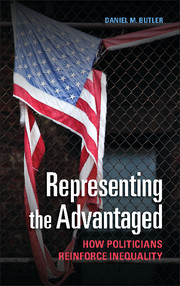Book contents
- Frontmatter
- Contents
- Acknowledgments
- 1 Representatives as the Source of Bias
- 2 When Can Representation Break Down?
- 3 Details of the Constituency Service Field Experiments
- 4 Bias in the Way Officials Process Constituents’ Opinions
- 5 Information Costs and Officials’ Proactive Effort Levels
- 6 Direct Discrimination
- 7 Bias in Politics
- References
- Index
2 - When Can Representation Break Down?
Published online by Cambridge University Press: 05 August 2014
- Frontmatter
- Contents
- Acknowledgments
- 1 Representatives as the Source of Bias
- 2 When Can Representation Break Down?
- 3 Details of the Constituency Service Field Experiments
- 4 Bias in the Way Officials Process Constituents’ Opinions
- 5 Information Costs and Officials’ Proactive Effort Levels
- 6 Direct Discrimination
- 7 Bias in Politics
- References
- Index
Summary
Politicians are not completely adaptable actors who come to office as blank slates (Burden 2007 and the review therein). Instead, politicians’ backgrounds influence their behavior in office, which, in turn, leads to bias in at least two ways.
First, elected officials who want to maximize their chances of winning should focus on the issues that they are most informed about. They should work on these issues because it is less costly to do so and therefore a more efficient way to achieve their reelection goals. Because politicians’ own backgrounds are an important determinant of the knowledge and experience that politicians have, voters who are numerically underrepresented in office are disadvantaged because the issues they care about receive less attention.
Second, bias can arise because legislators come to office with personal biases. These biases can affect the representation process both at the input stage of the policy-making process, when politicians consider constituents’ opinions, and directly at the output stage of the process. Some groups may be underrepresented because public officials are simply biased against them when they create policy and other outputs. Studying the inequality of representation at these parts of the process allows me to see where political inequality arises for various groups.
Other Parts of the Representation Process
These aspects of the representation process do not constitute an exhaustive description of that process. Most prominently, prior research has focused on the differences in groups’ rates of political participation (e.g., Verba and Nie 1972; Piven and Cloward 1988; Rosenstone and Hansen 1993; Verba, Schlozman, and Brady 1995; Lijphart 1997).
I focus on these aspects of the process, however, because they provide the best opportunity to test the claim that politicians’ backgrounds lead to inequality in representation. These are the points in the process where politicians take direct action. By studying politicians’ direct actions we can see whether they act evenhandedly with different constituents. Despite the importance of directly studying politicians’ behavior, scholars have given much less attention to how politicians respond to the inputs or messages they receive from constituents. As Sidney Verba puts it, “The literature on the receipt of messages and the response to them is not as well developed as that on the messages sent” (2003, 666).
Information
- Type
- Chapter
- Information
- Representing the AdvantagedHow Politicians Reinforce Inequality, pp. 12 - 22Publisher: Cambridge University PressPrint publication year: 2014
